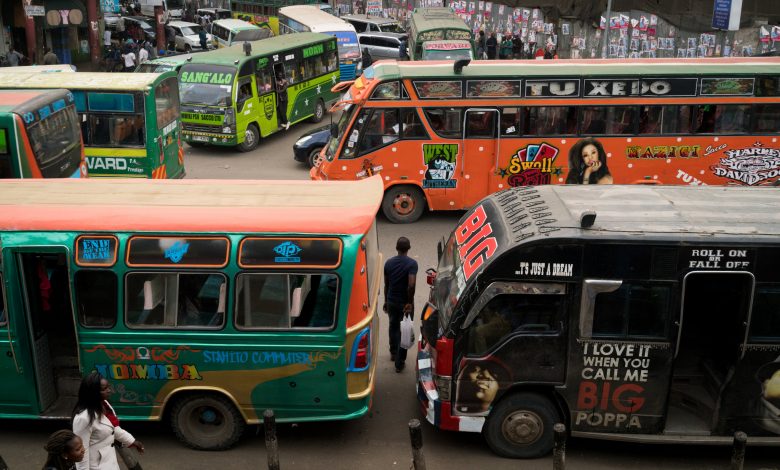Mass Exodus Hits Congolese, Kenyan Cities As COVID-19 Lockdown Looms

Samira Sawlani, a journalist based in Brazzaville, Congo, on Tuesday, shared a video of Congolese fleeing the capital city, in clusters likely to defeat the purpose of social distancing.
She followed up the visual clip with a narration on her twitter handle: “Ahead of a 30-day lockdown set to begin tonight, many in Brazzaville were seen at the bus station today leaving the city for their rural homes.
Congo Republic has registered 19 cases.”
Thousands of people in Congo and Kenya, torn between protecting their health and staying hungry, are fleeing the capitals to rural areas due to government policies of public lockdowns.
Public affairs commentators in both countries are seeing the exodus as normal considering that millions of baseline populations of the cities were day dependent wage earners and unemployed persons.
For such mass of impoverished population demographics to survive a period of lockdown and zero economic activities, they were likely to move away from the cities to the rural communities where they are most likely to access farm harvests.
Most African village economies are still receptive to batter and communal goodwill, elements that are mostly alien to city economies. In effect, it was not difficult for thousands of the poor dwellers in these cities to make the necessary call and vote with their feet.
They also noted that the lockdown method, though effective, is not suited to the lifestyle and culture of Africans and thus, would be hard on millions of city dwellers across Africa.
Hope Mwinzi, an entrepreneur living in Nairobi, Kenya, visualised the following challenges: “These lockdowns ( even curfews) across Africa aren’t tailor-made for how we work or live or move. We need to think of other solutions.”
“Imagine a lockdown in a flat with no balcony, no access to sunlight thus needs to have lights on during the day plus shared toilets. Most Nairobi estates people buy water daily.” @SomaKenya tweeted.
However, the situation seems to be faring better in Rwanda. “In Rwanda, if you are caught outdoors you are taken to a stadium to sit all day. #StayAtHome #Day5,” @MissNaturaella, a South African based female journalist tweeted.
For clarity, this punishment is not applicable to people seeking essential services. Arthur Kaneza, who is based in Kigali explained: “Actually there are priority services like selling and buying food in a given limited time, pharmacists, mobile money, bank, etc.
“When you go to the hospital for an emergency or an appointment with a message from your doctor you pass. But when caught lying then you join the group,” he said.
The fleeing Kenyans and Congolese city dwellers believe that their families are safer from COVID-19 in the rural villages. So far, Congo has recorded 19 cases while Kenya has 59 cases. These numbers are suspected to be grossly under-reported figures due to insufficient testing kits.
For Kenya and Congo, the safety concerns and fear of restrictions have also combined with factors such as easy access to food from farms in the rural areas to trigger the movement.
The exodus is clearly a choice between a distant danger and daily starvation for several people tweeted James Smith @Jayaseto “It all boils down to one thing; food security.
“The poor can get away with not paying rent for this period of time but living hand to mouth means when their hands don’t work their mouth stays dry. Best believe the government won’t feed no starving mouths. Make a choice – food or corona?” he said.
Meanwhile in Cameroon, cases have jumped to 193 with citizens being begged to stay at home to limit the spread. Tech entrepreneur, Rebecca Enonchong wrote on Twitter, “Cameroon up to 193 COVID19 cases.
“Of 94 quarantined, tested from one flight, 51 are positive. 19 need retesting. 54 percent. Wondering if they were already infected or if they got infected during quarantine.
“To highlight danger, I estimate 15.000 arrived in Cameroon since March 1,” she said.
From the situation across Africa, two issues are prevalent and need urgent attention – first, the need to ramp up testing and second, the need to provide proper palliative measures for the poor.
Support Our Journalism
There are millions of ordinary people affected by conflict in Africa whose stories are missing in the mainstream media. HumAngle is determined to tell those challenging and under-reported stories, hoping that the people impacted by these conflicts will find the safety and security they deserve.
To ensure that we continue to provide public service coverage, we have a small favour to ask you. We want you to be part of our journalistic endeavour by contributing a token to us.
Your donation will further promote a robust, free, and independent media.
Donate HereStay Closer To The Stories That Matter




